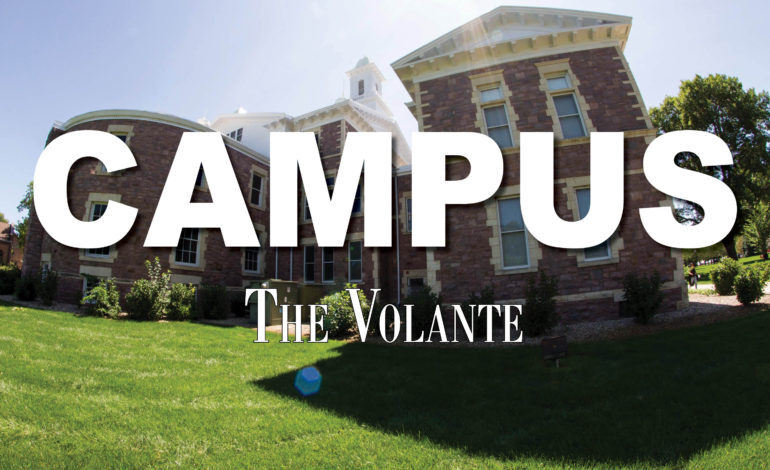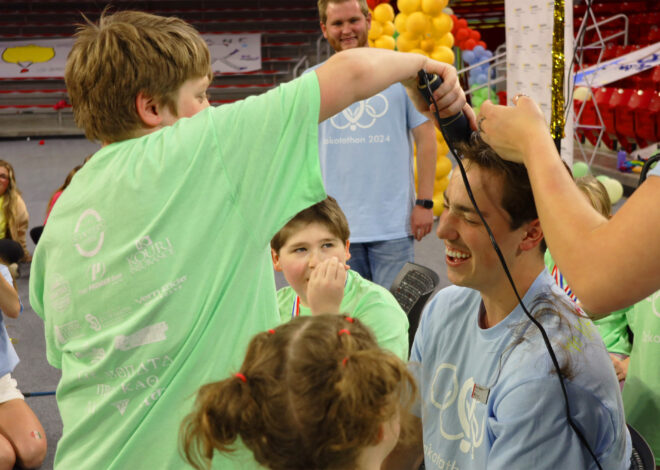
USD SERVE adopts new methods to lend a hand to community
Students Enhancing Resources for Vermillion Enrichment (SERVE) has continued to provide assistance to the Vermillion community, despite COVID-19.
SERVE allows USD students to get involved in the community by volunteering their time to one of the organization’s service branches.
The service branches include Adopt-a-Grandparent, Adopt-a-School, Big Pal Little Pal, Bridges, Heroes, Variation of Volunteering and the Food Recovery Network (FRN) — a new branch to SERVE this year.
Rachel Sestak, a junior medical biology major and FRN Chairman, said the FRN focuses on sustainability and food insecurity.
Last year, the FRN had two volunteers, as they weren’t affiliated with SERVE. However this year, SERVE adopted the FRN and involvement in the branch has grown to 18 volunteers. This growth, Sestak said allows members to expand the food services they provide to the community.
The FRN collects hot food to donate to the Vermillion Welcome Table, which provides community members free hot meals on Monday nights.
Recently, the FRN started collecting food for Charlie’s Cupboard, which is available for all USD students with a current USD student ID. In addition, the FRN has also started collecting food for the Vermillion Food Pantry.
“Food that would be wasted gets allocated to people who have food insecurity,” Sestak said. “From Aramark, we recover about 200 pounds per week of food or more. So, that is a lot of food that is saved from being wasted and allocated to people that need it.”
The people in the Vermillion community who can’t afford to buy proper meals for themselves are impacted largely by the FRN, Sestak said.
“When I work at the Welcome Table, I am able to see how grateful the people are to receive a good, hot and nutritious meal that they otherwise wouldn’t have had that night,” Sestak said.
Haley Rust, a senior medical biology major and SERVE president, said the overall goal is helping the Vermillion community. This year, it will look a little different due to COVID.
Adopt-a-School (AAS) allows USD students to interact with and set an example for the elementary and middle school kids in Vermillion, but this year it will be done virtually, Rust said.
“AAS will be doing virtual services such as reading books and giving those recordings to teachers to use for a break in class while they get caught up on paper work, like they would normally do if we were able to be there in person,” Rust said.
Callie Luke, a junior nursing major and Adopt-a-Grandparent (AAG) chairman, said the activities and form of interaction between AAG volunteers and residents will be altered this year as well.
Luke said, AAG was designed to bring comfort to residents through time spent with service members.
“This year AAG volunteers will do more of a pen pal service with their residents,” Luke said. “Sending activities through the mail, whether it be a word search, a coloring page, a crossword puzzle and little care packages.”
Face to face interaction, Luke said, with the residents for AAG isn’t completely ruled out however.
“There’s a possibility of residents having meetings out in their courtyard with Plexiglass set up,” Luke said. “If visiting in person isn’t an option, we are hoping to do FaceTime calls with the residents.”
The Vermillion community who have family members in the AAG branch and AAS branch know that the USD volunteer students are there for their family members and are wanting to make a difference, Luke said.
“SERVE makes it so the community has something to fall back on and it shows that college students aren’t the stereotype,” Luke said. “It shows that they’re willing to volunteer and do so much for the community.”
SERVE has allowed USD students to get involved with the community in a way that wouldn’t be possible otherwise by getting to interact with residents or elementary and middle school kids, Rust said. This has helped, she said, bring community members and USD students together outside of just campus.
“SERVE gives students a chance to get out of their comfort zones, meet people that they wouldn’t have met otherwise, like other students that aren’t in their classes or residents at a nursing home,” Rust said. “It allows for them to cross that boundary of USD student and community member and find a bridge between those two things.”


